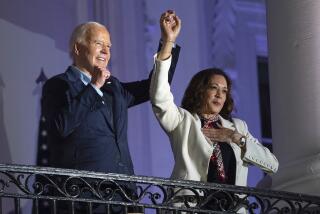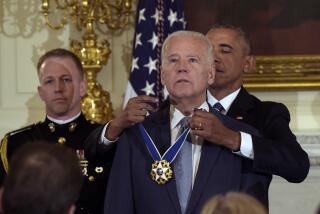The race to define Mitt Romney is on
Now that President Obama is prepared to formally launch his reelection bid, the race is on — to define his opponent, Mitt Romney.
The president and his strategists are convinced they can make a strong case for a second term: that Obama rescued the country from another Great Depression; that Romney and his fellow Republicans would go back to the policies that nearly cratered the economy; that the presidential contest is, fundamentally, a fight over fairness.
Obama is expected to say as much when he officially kicks off his campaign Saturday with swing-state appearances in Columbus, Ohio, and Richmond, Va.
But a referendum on Obama and his job performance is a dicey proposition at a time the economy is uncomfortably shaky and the president’s approval ratings are middling at best. A Labor Department report Friday showing the creation of 115,000 jobs in April, far fewer than analysts had expected, underscores the peril Obama faces.
So the White House hopes to turn the November election into a choice between the incumbent and the alternative, who, both sides agree, remains a mystery to a great many voters, especially independents and others still open to persuasion.
That may be surprising, given that the former Massachusetts governor has essentially been running for president for more than six years, delivering countless speeches and participating in several dozen nationally televised debates, the first in May 2007.
But that assumes voters are following the presidential campaign far more closely than most have been. There is a reason swing voters and others who are undecided have yet to firmly make up their minds: With the election six months away, many are scarcely paying attention.
A survey taken by the Pew Research Center in early March, when the GOP nominating fight remained highly competitive, found that fewer than 4 in 10 Republicans and 3 in 10 Democrats were closely following campaign news. Only about a quarter of political independents, a prime target in November, were paying close attention.
Romney “may be well-known by people intensely following the process,” said Tad Devine, a Democratic strategist who worked against Romney when the Republican made his first run for office, an unsuccessful 1994 U.S. Senate bid in Massachusetts. “He’s not well-known by the people who will decide the election.”
That presents a vacuum — and an opportunity — for both sides.
The Obama campaign is eager to focus on Romney’s four years as governor — the state was 47th out of 50 in job creation, a statistic that voters will probably hear often — and on the job reductions he oversaw at the private equity firm Bain Capital before entering politics.
“This election will be a choice between two candidates, two records and two visions of the future,” said Ben LaBolt, an Obama spokesman.
A recent campaign spot airing in Ohio, Virginia and a third battleground state, Iowa, hit Romney on both aspects of his career. The ad accuses him of shipping private-sector jobs “to places like Mexico and China” while at Bain and outsourcing state jobs “to a call center in India” as Massachusetts governor.
“It’s just what you’d expect from a guy who had a Swiss bank account,” said the tag line of the spot, which hits two points the Obama campaign seeks to emphasize: Romney’s wealth, as a way of suggesting he is out of touch with average Americans, and the notion of shady dealings, as a means of raising doubts about his character and veracity.
The response from the Romney campaign was telling, ignoring specifics of the ad and attacking Obama’s record on jobs, the rising national debt and the lackluster recovery from the recession. “The American people have suffered enough over the last three years and deserve better,” said Amanda Henneberg, a Romney spokeswoman.
Strategists for the presumptive GOP nominee want the election to be first and foremost about the incumbent and the economy. Romney won the nomination, in good part, because of his business background, and polls show voters believe he could do a better job than Obama of handling the economy. It is one of his greatest advantages over the incumbent.
But the Romney team recognizes that many voters have only a superficial knowledge of their candidate, making him vulnerable, in the words of one strategist, “to whatever Obama and the Democrats throw at him.”
By making Romney a more familiar and well-liked figure, the Romney campaign hopes not just to repel those attacks but to broaden his appeal — especially among female voters, who strongly favor Obama — and to make his can-do economic pitch more believable.
One part of the strategy involves a more prominent role for his wife, Ann, who is seen as humanizing her often-awkward husband and making him seem more of a regular guy. Romney’s allies, through their nominally independent “super PAC,” have also begun running a spot in several battleground states that recounts a story from his time at Bain: He briefly shuttered the firm to help a former business partner find his missing daughter. It suggests there is more to Bain — and Romney — than just making money.
The presidential campaign has entered a lull of sorts. With the GOP nominating fight over, Romney is working to heal lingering wounds and audition potential vice presidential running mates. Obama is trying to avoid the appearance of being a full-time candidate for as long as possible, mixing overtly political events with others that, while politically meaningful, arguably fall under his duties as president.
But that is not to say this time is unimportant.
“Voters accept information at their own pace,” said Republican strategist Mike Murphy, noting they will take in more around big events like the selection of Romney’s running mate, the candidates’ speeches to their nomination conventions and, especially, the presidential debates. “In many ways, this phase of the campaign is a jump ball,” said Murphy, with both sides hoping to fill the void to their advantage.
Presidential campaigns aren’t decided in May. But the impressions that are formed in the next several weeks and months could go a long way toward determining who does prevail in November.
More to Read
Sign up for Essential California
The most important California stories and recommendations in your inbox every morning.
You may occasionally receive promotional content from the Los Angeles Times.











